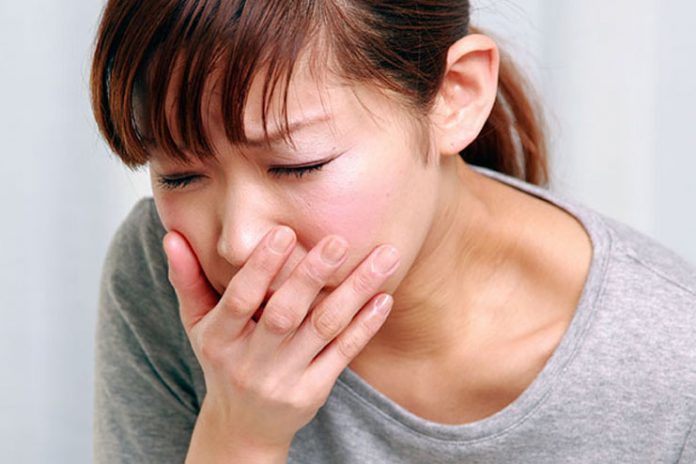Affiliate Disclaimer
Some links in this article are affiliate links. We may earn a small commission if you make a purchase through these links, at no extra cost to you. We only recommend products we find useful to our readersFood poisoning, the term itself seems scary. However, it is not that uncommon. As per the data from the Centers for Disease Control and Prevention (CDC), 1 in 6 Americans suffer food poisoning each year. To learn more about food poisoning, its causes, symptoms, and treatment, read through this HealthSpectra post. Be informed and value your health.
What Is Food Poisoning?
Food poisoning is the common name for foodborne illness that is caused due to the consumption of spoiled, contaminated, or toxic food. Generally, the condition manifests through diarrhea, nausea, and vomiting, which are the early signs of food poisoning. It is an uncomfortable, yet not unusual condition.
Symptoms Of Food Poisoning:
Symptoms widely vary based on the source of infection and even the time taken to heal depends on it. However, the symptoms can manifest anytime between 1 hour to 28 days of food poisoning. More symptoms include:
- Abdominal cramps
- Diarrhea
- Loss of appetite
- Mild fever
- Vomiting
- Weakness
- Headaches
- Nausea
If severe life-threatening symptoms are observed, visit your doctor immediately. They include persistent diarrhea for over 3 days, fever higher than 101.5°F, exhaustion, difficulty talking or viewing, bloody urine or stool, and severe dehydration.
More Severe Life-threatening Symptoms Include:
- Persistent diarrhea for over 3 days
- Fever higher than 101.5°F
- Difficulty talking or viewing
- Severe dehydration including dry mouth, passing little to no urine, and difficulty holding on fluids
- Bloody urine
See your doctor immediately in case of the severe symptoms. Read more to learn about the causes and ways to prevent food poisoning.
Complications Of Food Poisoning:
Dehydration is the top most complication associated with food poisoning, as it may lead to significant water loss out of the body, besides causing an imbalance in the electrolyte levels in the blood. In a few cases, persistent vomiting may make it difficult to swallow and digest the prescribed medications. However, complications of food poisoning are specific to infection-type.
Do not neglect to see your doctor immediately in case of the severe food poisoning symptoms. Read more to learn about the causes and ways to prevent food poisoning
What Causes Food Poisoning?
As mentioned earlier, food poisoning or foodborne illness occur mainly due to bacterial contamination, viral contamination, or food contamination by the parasites. Thus, types of food poisoning can be categorized based on the source of infection.
1. Bacteria:
The most common and prevalent cause for food poisoning is bacteria like E. coli, Listeria, and Salmonella. Salmonella is the main cause for serious food poisoning cases in the US. As per the data from the CDC, around 1,000,000 food poisoning cases and 20,000 hospitalizations happen annually due to Salmonella infections. Two more lesser-known causative agents include C. botulinum (botulism) and Campylobacter.
2. Viruses:
Viruses also cause food poisoning. Every year, more than 19 million cases of food poisoning cases are caused due to the norovirus, also known as the Norwalk virus. Sapovirus, rotavirus, and astrovirus are less common causative agents. Hepatitis A virus is a serious condition with potential to transmit through food.
3. Parasites:
Parasites are less common causative agents of food poisoning, compared to bacteria. The most common causative agent is Toxoplasma, which can live for years in the digestive tract.
- In short, the most common pathogens that cause food poisoning include Norovirus, Salmonella, Clostridium perfringens, Campylobacter, and Staphylococcus aureus
- Salmonella, Norovirus, Campylobacter, Toxoplasma gondii, E. Coli are the most common pathogens that cause hospitalizations.
- Common pathogens that cause deaths include Salmonella, Toxoplasma gondii, Listeria monocytogenes.
4. Certain Chemicals
Certain chemicals too may lead to food poisoning as they are toxic in nature. Much research is required on the various chemical used across industries. For example, mercury may enter the drinking water and the fishes like martin and tuna. Such chemicals are toxic and may lead to food poisoning cases.
How Does Food Get Contaminated?
In reality, pathogens are found in almost all the foods that humans consume. However, cooking heat kills pathogens on the foods. Food consumed raw may become the common sources of food poisoning. Food products like dairy, eggs, and meat are frequently contaminated with illness-causing organisms. Also, stale food, canned or bakery foods are also at increased chances of contamination.
Who Is At Increased Food Poisoning Risk?
Everyone and anyone can be prone to food poisoning. Because, pathogens/causative agents are found in almost all the foods that humans consume. Generally, cooking heat can kill these pathogens on the foods. So, improperly cooked foods or raw foods or stale foods majorly lead to food poisoning.
Even otherwise, people with relatively more food poisoning risk include:
- Those with autoimmune disorders
- Suppressed immune system
- pregnant women (due to the changes happening in their body like metabolism and circulatory system.
- Aged or elderly (as they are sensitive and have compromised immune system)
- kids (as they usually do not have developed immune systems)
How Can We Diagnose & Treat Food Poisoning?
Symptoms serve as the primary diagnosis for the food poisoning. Stool tests, blood tests of the patients are conducted to check or the presence of infection causing agents. In some cases a few other tests are conducted on the foods consumed to check for the contamination. Urine tests on the affected patients help evaluate the levels of dehydration and the treatment proceeds accordingly.
Low food poisoning can subside in 3 to 5 days with simple care at home. Necessary care at home can help quickly recover food poisoning.
- Consumption of plenty of fluids like water, coconut water, sports drinks (rich in electrolytes), plan fruit juices, etc. help keep hydrated. Also, fluids help patient recover from fatigue.
- While suffering food poisoning, it is important to avoid foods containing digestive tract irritants like caffeine, spicy foods, etc. Instead one can opt for decaffeinated teas with soothing herbs like peppermint, dandelion, and chamomile etc. These foods help calm down the stomach. Learn here about more general home remedies for upset stomach.
- OTC pills like Pepto-Bismol and Imodium can help suppress nausea and control diarrhea.
However, consult your doctor if you are not sure and want to be extra safe. Also, rest enough to recover faster. In severe food poisoning cases, hydration is needed with intravenous (IV) fluids at a hospital. Doctors prescribe antibiotics as part of food poisoning treatment, to subside the infection.
Best Foods To Have When You Have Food Poisoning:
Opt for simple-to-digest foods that are bland and low in fat, such as
- Bananas
- Gelatin
- Crackers
- Oatmeal
- Rice
- Chicken broth
- Boiled vegetables
- Bland potatoes
- Toast
- Sports drinks
- Diluted fruit juices, etc.
Foods To Avoid When You Have Food Poisoning:
- Avoid foods like
- Fatty foods
- dairy products (cheese and milk)
- seasoned foods
- spicy foods
- food with high sugar
- fried foods etc.
To avoid further stomach upset. Totally avoid:
- Caffeine (soda, coffee, energy drinks)
- alcohol, and nicotine.
Avoid sushi and other fish products that are served undercooked or raw, hot dogs that are not cooked or heated, ground beef, unpasteurized milk, juice, and cheese; raw, unwashed fruits and vegetables.
At the same time, opt for simple-to-digest foods that are bland and low in fat, such as bananas, gelatin, crackers, oatmeal, rice, chicken broth, boiled vegetables, bland potatoes, toast, sports drinks, diluted fruit juices, etc. to recover quickly from food poisoning.
How To Prevent Food Poisoning?
The best way to handle or prevent food poisoning is to avoid any potentially unsafe foods. Avoid foods that are more likely to cause food poisoning. Foods like dairy products, eggs, meat, canned or bakery foods are with high chances of contamination.
- Cooked foods are the best, provided they are prepared hygienically.
- Thoroughly wash hands before cooking or eating food. Ensure to seal and store foods well.
- Raw products have to be sanitized or washed before consuming.
In conclusion, statistically, everyone are with equal chances to encounter food poisoning at least once in the lifetime. The good part is that people recover within 48 hours from food poisoning with the right approach. According to the CDC, life-threatening cases of food poisoning are extremely rare. So relax, but follow minimum hygiene and measures to be safe.
In this Article


















